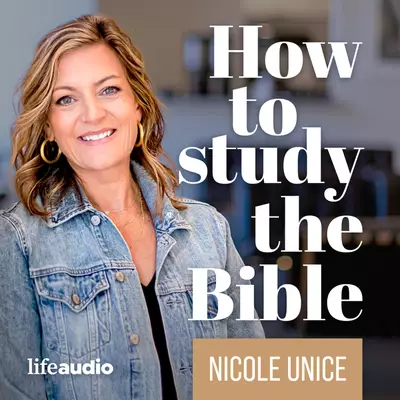Listen on Your Favorite App
When We Disagree (Romans Bible Study Chapter 14)
December 06, 2021
00:00
21:32
Listen on Your Favorite App
Click here to subscribe to Nicole's mailing list and receive bonus resources on Romans
Click here to join the conversation in Nicole's Romans Facebook group
Questions We Ask Every Time We Read the Bible:
1. What do the verses say?
2. What's the backstory? What's the context?
3. What does it mean? What are the principles of this passage?
What does it say?
Romans 14 instructs readers to not do anything to cause a brother or sister to fall or stumble. We learn through this passage that we are the ones responsible for making efforts to cultivate peace and build those up around us.
What’s the backstory?
As the early church is being established, there in a specific dispute over whether Christians must abide by Jewish food laws. In this passage we find Paul giving instruction on how to interpret disagreements. First and foremost, he encourages readers to do what ultimately leads to peace.
What does it mean?
The principle of this passage is not about ceremonial foods, it is about what to do when we have different views within the kingdom of God. We are instructed to honor the one whose faith is weak and honor what they believe leads them to peace.
What does it mean for me?
As we go into the holidays, be mindful of what this means for you and do what leads to peace and mutual edification.
*****
Resources:
Help! My Bible Is Alive
Follow Nicole:
Her Site | Facebook | Instagram
Episode Image Credit: Getty
Click here to join the conversation in Nicole's Romans Facebook group
Questions We Ask Every Time We Read the Bible:
1. What do the verses say?
2. What's the backstory? What's the context?
3. What does it mean? What are the principles of this passage?
What does it say?
Romans 14 instructs readers to not do anything to cause a brother or sister to fall or stumble. We learn through this passage that we are the ones responsible for making efforts to cultivate peace and build those up around us.
What’s the backstory?
As the early church is being established, there in a specific dispute over whether Christians must abide by Jewish food laws. In this passage we find Paul giving instruction on how to interpret disagreements. First and foremost, he encourages readers to do what ultimately leads to peace.
What does it mean?
The principle of this passage is not about ceremonial foods, it is about what to do when we have different views within the kingdom of God. We are instructed to honor the one whose faith is weak and honor what they believe leads them to peace.
What does it mean for me?
As we go into the holidays, be mindful of what this means for you and do what leads to peace and mutual edification.
*****
Resources:
Help! My Bible Is Alive
Follow Nicole:
Her Site | Facebook | Instagram
Episode Image Credit: Getty
Discover more Christian podcasts at lifeaudio.com and inquire about advertising opportunities at lifeaudio.com/contact-us.
More Episodes
See all episodes
Meet Your Host

Nicole Unice is a Bible teacher, author, and passionate communicator who delights in bringing God’s Word to life in a personal and relevant way. Her training as a counselor informs her work, as she emphasizes the importance of facing our own reality and embracing the transforming power of God’s grace. Nicole is ordained as a teaching elder in the Evangelical Presbyterian Church. Her latest book, “Help, My Bible is Alive” is a 30-day experience designed to help people experience God through the Bible.
Nicole has spent twenty years serving the local church, first in student ministry (where she’s never lost her love of a great group game) and then leading start-ups of all kinds, from leadership development to capital campaigns. She now teaches and consults with churches and ministries to strengthen their stories and cut through confusion to discover the next right steps for success.
Nicole has spent twenty years serving the local church, first in student ministry (where she’s never lost her love of a great group game) and then leading start-ups of all kinds, from leadership development to capital campaigns. She now teaches and consults with churches and ministries to strengthen their stories and cut through confusion to discover the next right steps for success.
